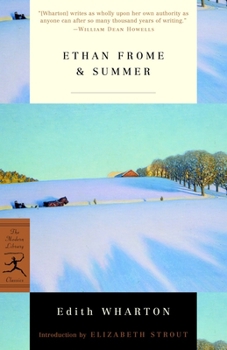Ethan Frome & Summer
Select Format
Select Condition 
Book Overview
A pair of masterly short novels, featuring an introduction by Elizabeth Strout, the Pulitzer Prize-winning author of Anything Is Possible and My Name Is Lucy Barton Thought Edith Wharton is best known for her cutting contemplation of fashionable New York, Ethan Frome and Summer are set in small New England towns, far from Manhattan's beau monde. Together in one volume, these thematically linked short novels display Wharton's characteristic criticism...
Format:Paperback
Language:English
ISBN:0375757287
ISBN13:9780375757280
Release Date:May 2001
Publisher:Modern Library
Length:304 Pages
Weight:0.58 lbs.
Dimensions:0.7" x 5.1" x 8.0"
Customer Reviews
2 ratings
Tragic love
Published by Thriftbooks.com User , 19 years ago
In a way, Edith Wharton was at her best in her novellas -- her stories are lean, taut and emotionally deep. That's what "Summer" and "Ethan Frome" have in common, as they look at love, sex, marriage and the conventions of the 1800s. Put together, these novellas are utterly fascinating. "Ethan Frome" is the male half of a loveless marriage, with the fretful, fussy Zeena. Then Zeena's lovely cousin Mattie Silver comes to live with them, and she brings out a happier, more passionate side of Ethan. But when Mattie is sent away, Ethan must make a decision. He knows he can't stay in his horrible marriage, so will he run away with Mattie? Or will something worse happen? "Summer" shocked the 1917 public, with its frank-for-its-time look at a young woman's sexual awakening. It takes place in the New England village of North Dormer, where the young librarian Charity lives. But when Charity falls in love with an upper-class young rake named Lucius, she finds herself pregnant and unmarried -- a destructive combination in the 1900s. Edith Wharton gave unvarnished looks at social conventions throughout her career -- she doesn't judge, she just tells it how it was, whether she's talking about the Roaring 20s or the uptight Victorian era. Divorce was almost unthinkable, affairs scandalous if revealed, and women had the cards stacked against them in matters of love, marriage and sex. Both novellas also display Wharton's talent for writing characters who were totally unlike her, especially working-class heroes. Charity is an uneducated, naive, rough-mannered young woman, while Ethan is... well, male. Neither is much like Wharton, but she gets inside their heads and makes them entirely believable. Wharton's formal writing style is offset by the starkness of her stories -- if she took a hard look at Victorian social conventions, she didn't flinch from showing what happened to those that transgressed. (I'll give you a hint -- neither novella has a smooching-lovers-ride-off-into-the-sunset finale) It's realistic, but a bit depressing. "Summer" and "Ethan Frome" are both tales of love doomed by social conventions, and also two of Wharton's best stories. Sad and beautiful, gripping and classic.
Tragic love
Published by Thriftbooks.com User , 19 years ago
In a way, Edith Wharton was at her best in her novellas -- her stories are lean, taut and emotionally deep. That's what "Summer" and "Ethan Frome" have in common, as they look at love, sex, marriage and the conventions of the 1800s. Put together, these novellas are utterly fascinating. "Ethan Frome" is the male half of a loveless marriage, with the fretful, fussy Zeena. Then Zeena's lovely cousin Mattie Silver comes to live with them, and she brings out a happier, more passionate side of Ethan. But when Mattie is sent away, Ethan must make a decision. He knows he can't stay in his horrible marriage, so will he run away with Mattie? Or will something worse happen? "Summer" shocked the 1917 public, with its frank-for-its-time look at a young woman's sexual awakening. It takes place in the New England village of North Dormer, where the young librarian Charity lives. But when Charity falls in love with an upper-class young rake named Lucius, she finds herself pregnant and unmarried -- a destructive combination in the 1900s. Edith Wharton gave unvarnished looks at social conventions throughout her career -- she doesn't judge, she just tells it how it was, whether she's talking about the Roaring 20s or the uptight Victorian era. Divorce was almost unthinkable, affairs scandalous if revealed, and women had the cards stacked against them in matters of love, marriage and sex. Both novellas also display Wharton's talent for writing characters who were totally unlike her, especially working-class heroes. Charity is an uneducated, naive, rough-mannered young woman, while Ethan is... well, male. Neither is much like Wharton, but she gets inside their heads and makes them entirely believable. Wharton's formal writing style is offset by the starkness of her stories -- if she took a hard look at Victorian social conventions, she didn't flinch from showing what happened to those that transgressed. (I'll give you a hint -- neither novella has a smooching-lovers-ride-off-into-the-sunset finale) It's realistic, but a bit depressing. "Summer" and "Ethan Frome" are both tales of love doomed by social conventions, and also two of Wharton's best stories. Sad and beautiful, gripping and classic.






